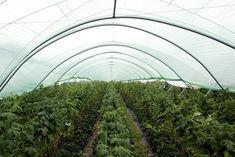
“There are no rules particular to the polytunnels planning process, and there never will be,” began David Glasson, NFU consuultant, as he opened the Fruit Focus seminar on the issue. Growers, he affirmed, will have to use existing legislation and legal avenues if they are to manage the polytunnels issue wisely.
Reviewing the situation, Glasson argued that the Herefordshire legal case was an important signal, but by no means a definitive precedent on the subject. Growers, if they were canny, and planned thoroughly, could maintain business-as-usual for the foreseeable future.
Glasson sketched out a checklist of useful tips for growers looking to manage the issue optimally in these uncertain times. He advised growers to:
•Get professional advice;
•Check land designations;
•Meet with senior planning officials to put forward your case in an informal way;
•Prepare a planning support statement, detailing why you need the polytunnels, how long they will exist for and how much they will require;
•Consult and the pacify neighbours. Explain your needs, and explain how you will be limiting the impact of tunnels on the landscape;
•Not to start in anticipation. Nothing is guaranteed to annoy planning officials than finding out that the application they are considering is already half-built;
•Read the NFU guidance document published in March of this year; and
•Be patient.
Similarly, herefordshire Farmer Anthony Snell then gave his take on how the situation could best be managed from a PR perspective.
The public don’t like ‘berry barons’ - the concept of high-yield industrial farming is viewed unsympathetically.
He recommended bordering the most publically visible farmland with green polytunnels, which despite their slightly lower yields and greater price tag generate a more sympathetic response from the public. Other than that, he advised growers to:
•Rotate tunnels around the farm;
•Keep the scale sensible;
•Keep polytunnels away from houses; and
•Use green tunnels wherever possible.
Commenting on the situation thus far, Snell emphasised the gravity of the situation, and urged growers to act: “Soft fruit has won a reprieve. This is our last chance to prove our case.”